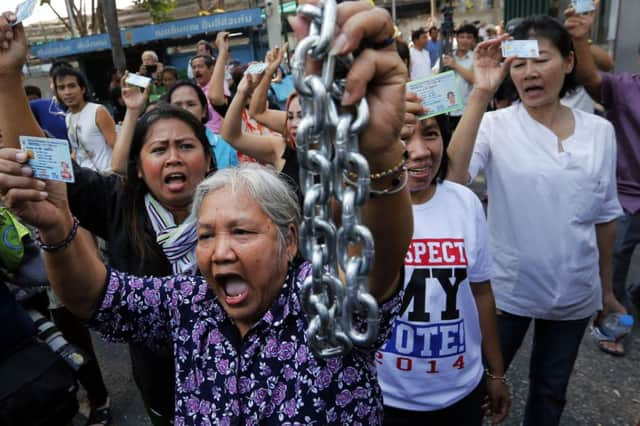Protesters stop many casting votes in Thai election


The election commission said poll closures affected about 18 per cent of the country’s 48 million registered voters.
Many of them may not have cast ballots anyway, however, following a boycott by the opposition Democrat party, which is demanding political and economic reform first.
Advertisement
Hide AdAdvertisement
Hide AdPrime minister Yingluck Shinawatra had called the vote to head off weeks of mass protests. Her party is widely expected to win but legal challenges and a lack of a quorum of MPs may create a political limbo.
Security has been heavy throughout Thailand, with vast areas under a state of emergency.
“The situation overall is calm and we haven’t received any reports of violence this morning,” said national security council chief Paradorn Pattanatabutr.
About 130,000 personnel had been deployed across Thailand yesterday, he added.
The election crisis, in which demonstrators have occupied major intersections across Bangkok and forced government ministries to shut down and work elsewhere, overshadowed the poll’s run-up to such a degree that campaigning was virtually non-existent.
Last night protest leader Suthep Thaugsuban said the government would be unable to declare a result in the election due to the polling station closures, adding: “Therefore the election is a waste of time and money.”
Anti-government activist Nipon Kaewsook said: “We’re not blocking the election. We’re postponing it. We still need an election, but we need reform first.”
The protests prevented voting from taking place in around a tenth of Bangkok’s 6,671 polling stations, and there was no voting at all in nine southern provinces.
Advertisement
Hide AdAdvertisement
Hide AdMs Yingluck’s Pheu Thai party has overwhelming support in these regions, while the south and parts of the capital are strongholds of the opposition Democrat Party, which is boycotting the election.
Her opponents took to the streets in November after her government tried to pass an amnesty law that would potentially have allowed her brother, Thaksin, to return from exile.
Thaksin, a former prime minister who fled during a court case in 2008, is reviled by the protesters, who say he controls the government from abroad.
Rather than “a contest among candidates, it was about whether the election itself could happen or not,” said Sunai Phasuk of Human Rights Watch. “That in itself says a lot about the fate of democracy in Thailand – it’s hanging by a thread.”
Protesters yesterday stopped voting by surrounding district offices housing ballot papers and preventing them from being delivered. They also pressured electoral officials not to report for duty, and in some cases physically prevented people from getting to polling stations.
In Bangkok, would-be voters in the Din Daeng district scuffled with protesters. The groups also hurled bottles at each other. One demonstrator fired a gunshot after several people tried to push past a blockade
“We want an election. We are Thais,” said Narong Meephol, a 63-year-old Bangkok resident who was waving his identification card. “We are here to exercise our rights.”
Ampai Pittajit, 65, a retired civil servant who helped block ballot boxes in Bangkok, said he did it “because I want reforms before an election.” I understand those who are saying this is violating their rights,” he said. “But what about our right to be heard?”